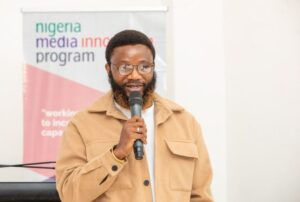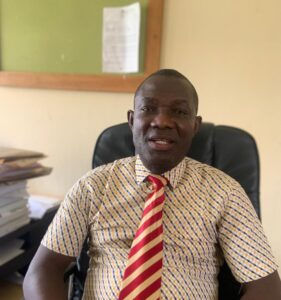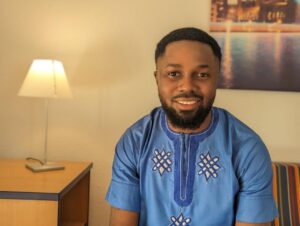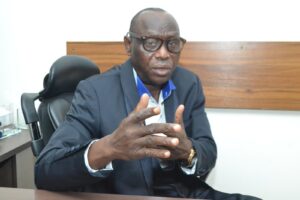His journey to becoming the Editor-in-Chief of two top digital media platforms in the country is not typical. As he admitted, Bayo Olupohunda, Editor-in-Chief of Opera News has been a bit of an outsider having not really taken up a full-time job while writing in the traditional media space.
From The Guardian to the defunct NEXT and The Punch Newspaper, Bayo Olupohunda former editorial head of Legit was involved in basic reporting, features, opinions, interviews and column writing along with being a teacher.
With the benefit of his work experience in both the traditional and new media platforms, Olupohunda in this interview with Lekan Otufodunrin, shared deep insights about the media landscape in the country, suggestions for the survival of the digital disruptions, state of the nation and other issues.
Since you published your book Are You Not A Nigerian? that examines the lost opportunities, the disappointment of successive administrations, and the dilemma of a nation at a crossroads, the situation in the country has become more worrisome. What is your view about how well we are doing as a country?
My book was published in the last quarter of 2017, precisely in the month of October. Has anything improved since its publication given that the book is a reflection of my thoughts on some of the existential socio-political challenges confronting us as a nation? My answer is no. But to honestly put the Nigerian Dilemma into perspective and properly contextualise it, I am going to reference a statement I often hear Nigerians say all the time when they compare the Nigeria of today with the post-Independence decade. People often refer to the good old days as against the Nigeria of today.
As a student of contemporary Nigeria’s history, especially the two decades after independence, those years were the most turbulent years of Nigeria’s political history. For example, as soon as the British left, the country descended into chaos. The Wild Wild West, the coup and counter-coups, the 1966 Pogrom, culminating in Civil War and many more coups. The country has not fared any better especially since 2017 when my book came out. The state of the country has become worse in terms of economic and political indices.
Look at the rate of Naira to foreign currencies. Look at the invasion of Fulani militias, bandits from the Sahel on a kidnapping and killing spree. Every day we hear of bandits and Fulani herdsmen invading villages to kill and maim. Our schools have become unsafe as kidnappers abduct hundreds of students almost on a daily basis. I have heard people say that Buhari is building trains. But what is the use of militias can gain access to your towns and villages and kill your people en masse, if kidnappers can abduct hundreds of students almost every day? If your people live in constant fear of their lives? Who will use the trains? Is it when we are all dead?
The truth is that we are not doing well. The country is more divided now than it used to be. The security situation is worse. Nigerians are poorer today. Though the poverty level has always been bad, it deepened in a very short time.
Is the media in Nigeria doing enough to hold the government accountable to the people and setting an agenda for good governance?
If you look at the pre and post-political history of Nigeria, you will agree with me that the media has always been at the forefront of the fight for a just society depending on the era. For example, the media was a major part of the fight for Independence during British rule. During the agitation to end the military regimes of the 1990s, the Nigerian media stood up to be counted. Remember that apart from the Civil Society Organisations, the media played a leading role in ending military rule. In the course of doing their job, many journalists were killed, some disappeared.
There was Bagauda Kaltho who in 1996 or thereabout died in a bomb attack in Kaduna. The Guardian newspaper was attacked. Journalists were arrested and jailed. Yes, the media has paid some prices and have sacrificed in the quest to liberate Nigeria from its rapacious elite. The coming of democracy in 1999 brought a shift in governance as a military rule ended that year.
Has the media fared well as the Fourth Estate in holding the government to account and set an agenda for good governance? This is debatable but if you ask me, I think the media has never stopped performing this role. The only difference is that it does not require going into the trenches as it was during the military era. The media continues to play this role as the country grapples with new challenges of monumental corruption and misgovernance. It just seems that though we fought to remove dictatorship for a stealing elite in the garb of politicians. Several corruption cases were exposed by the media. Remember also that some newspapers had to pay the price as they were made to shut down because they did not compromise their editorial integrity by exposing corruption. One of such is the Next newspaper. Several online media have emerged and are exposing corruption in the system. Journalists are carrying out investigations.
So yes the media is performing its role as watchdogs. But we also know that when you are fighting a system as rotten as Nigeria’s political and economic systems with powerful players, journalism becomes a risky profession because you can be taken out like a fly. We know what has happened to many journalists who dared to confront the system. The media is not the military and will not attempt to carry out treason, the power is the pen and the media has been using it. I must admit there have been some moments when the media has not played this role. I believe this has to do with media ownership. We now have a situation where politicians who have been indicted for corrupt practices establish media houses. How do we expect journalists working in those establishments to speak truth to power? There will always be a no-go area. That journalist will never attempt to write about his employers, his friends and business interests. That is one of the reasons why we need independent journalism and foundations that can exist without the support of the establishment. That is why Nigerians need to support independent media to thrive and continue to play its role in our country. The current traditional media space is too corrupted to play this role. Not because they cannot but due to their ownership structure.
Your media career has seen you move easily from the traditional media to managing top digital platforms, what made this possible for you?
I have been a bit of an outsider if you consider that I have never really taken up a full-time job while writing in the traditional media space. The closest I have had was as a writer with the Guardian where I also interned in the late 1990s. But between 2007 and 2010, I did some really great writings in both the Guardian Daily and the Sunday paper. I also reported on the Lagos Art scene which eventually got me a Goethe Institut scholarship to Dusseldorf, Germany where I wrote travelogues in the same paper about Nigeria-German realities. Not many people knew I was also a teacher in those years as a gap. But I spent most of the early writing years with the Guardian and just doing basic reporting, features, opinions and interviews under the legendary Sunday Editor, Jahman Anikulapo who I will credit for my formation and giving me a big byline in those years.
After I returned from the scholarship, Next newspaper had debuted so I joined the Metro Desk also on a freelance basis and wrote a column titled ‘Lagos Rant’ which I deployed to highlight some of the dysfunctions in the emerging megacity. In 2012, Punch Newspaper was expanding the Op-Ed page to include columnists and I was tapped by Joel Nwokeoma as a columnist. Prior to joining Legit as Editor-In-Chief in 2016, I had worked as a columnist, then Desk Head for the online media City Guide. During this time I took examples from the big New York City Guide magazine to create a Lagos tourism page, then in 2019, I joined Opera.
READ ALSO: Dear Reporter: How editors should mentor their reporters
As you can see in my media trajectory, I can say the years I spent writing in traditional media, studying digital media and its emergence and impact on journalism practice prepared me for these roles. In between writing and journalism practice, I had also equipped myself for these roles. Though it was tough to combine full-time work and studying, I enrolled and finished a Masters in Media and Communication at the prestigious Pan Atlantic University’s School of Media and Communication where I did courses in Digital Media, Media Ethics and Enterprise, Writing in Journalism and Marketing Communication, I did some short courses in Media and Development and recently too in my current role as Head of Content at Opera Nigeria’s fully automated newsroom where Artificial Intelligence, Natural Language Processing and Machine Learning drive the content strategy.
The experience has been interesting. As Head of Content especially in digital media, you must understand that there has been a shift in how we traditionally define the content and how to deploy technology and analytics to predict and understand users’ behaviour on your platform. That is the difference between digital media and traditional journalism. This understanding of current global best practices in the intersection of digital and traditional media shaped my understanding.
Why are many local digital platforms not doing as well in terms of reach and revenue as foreign ones operating in Nigeria?
I mentioned to you earlier that there has been a shift in how we define and serve content to users with technology as its main driver. While the essence of content remains the same, how you present it to your readers, in what format, when and where is also important. Many times when I check local domains in Nigeria, I conclude many digital media platforms are not ready to put in the works. There is the general perception that once you launch a website, it will suddenly translate into traffic and revenue without defining your content strategy, distribution channels, technology and sustainability. These are the basics.
You cannot run a media where you are the sole determinant of what content you serve your readers. You will need an analytics system to understand the behaviour of your readers and this will ultimately give your team insight into what content you curate for users and use algorithms to sort posts. You will also often see domains which at the inception promise to deliver niche content but derail into basic news reporting. If your content direction is education, tech or relationship, then stick to it
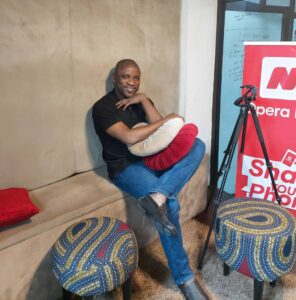
Digital platforms like yours have trust issues based on some content shared. What are you doing to ensure that your contributors are ethical in their reporting?
Let me put it this way that the media, like every media organisation, generally have trust issues, not just digital platforms. What we should be concerned about is what the media is doing to build trust in their users and the public. Digital media, unlike traditional media, depends on several sourcing models for news. One of these is user generated. Content aggregation comes with many hazards. The revenue model of content aggregating in digital media is traffic. The more viral and diverse your content, the more it translates into users acquisition and revenue.
In my organization, for example, we have a strict editorial review system and guidelines that place emphasis on fair and accurate reporting. Let me admit that some of the contributors have in the past violated our platform rules, but our strict review system has penalised authors who deliberately post fake news and bad content. We continue to ban or suspend authors or domains who consistently post bad content. We may even suspend payment for the authors. We also don’t just punish, we also train the authors both online and offline. These measures have greatly reduced the incidences of the content we consider not in line with our guidelines
What are your suggestions for media owners and managers to survive the disruption of the media landscape that has made it impossible for some to meet their obligations to their staff?
Apart from the recent digital media disruption of the traditional media space, the pandemic has also led to the loss of revenue, layoffs etc. Digital media has particularly broken the stranglehold of traditional media and democratised the media. Adaptation is important to survive recent chaos in the social order. Willingness to embrace the disruption and diversify will also be important for media who hope to survive. The coming decades will be even critical for the media in terms of content and practices that imbibe new media.
But most media organisations in Nigeria have not been run like a proper business. There is too much patronage in the system and I put this to media ownership which is modelled on one-man business glorified as a corporate entity. I spoke of diversifying into other business interests. Do you know that the New York Times has other media assets grossing millions of dollars apart from its titles? To survive the disruption, the news is business and media owners must treat it as such.
What has been your experience with recruiting journalists and what skills should those who want to excel in the profession have?
My experience has been very interesting. Recruiting writers, young journalists is one of the most important job descriptions of a chief editor because you achieve two things. One is that you are able to give opportunities to young people to start a career in the profession. The second thing is there is continuity of talents in the newsroom. This later is very important considering the concern about the dearth of editors and journalists coming into the system. Apart from hiring full-time staff, I also find valuable the experience of hiring interns who will ultimately develop to be full-time staff.
So, yes it’s been fulfilling but the real experience is the concern I have about the mismatch in the current mass communication curriculum in our schools, pedagogy and practices in media both in Nigeria and globally. The mass communications curriculum currently in use in mass communication classes in our schools are obsolete and cannot meet the needs of today’s media practice. Yes, this curriculum may teach the basics definitions and concepts but how about new developments, media technology and their applications in the media?
Young graduates I have interviewed seem to lack these concepts. Some of them can’t even write a simple essay without obvious errors. I believe the basics for any aspiring journalist is writing skill. But I have interviewed a lot of journalists who lack these basics. And I make no distinction between private and public school graduates, there seems to be a general decline in the quality of mass communication graduates. It’s just not enough to tell me you attend the Nigeria Institute of Journalism. I don’t even hire based on certificates from mass communication schools, you must be able to write. So my suggestion is for experts in the field, academics, journalists in all the genre, online and broadcast meet to look into the curriculum in mass communication and update it with current best practices in media practice
What are some new developments in global media practice that Nigerian journalists should be paying attention to?
Legacy media are struggling as digital startups emerge. The line between print and broadcast media organisations is blurred. Multimedia tools are creating new ways of storytelling. Nigerian journalists should pay attention to the impact of technology on the media. How can we use different technological tools to amplify stories that matter, stories that can drive change in our society?
I am also studying the impact of local journalism. Global media practices are also focusing mainly on how local journalism reporting can create inclusion in society. We need more journalists who can drive this change. We also need more local reporting. We can use all the genres of reporting -broadcast, online, print and radio to achieve this. It’s not just enough to sit in Lagos and Abuja and major cities to report. We need to tell untold stories. Good thing is that there are grants for local reporting in all media genres. One major development is also the impact of digital media on journalism practices. Now that it’s clear that the future of journalism will largely be mobile, Nigerian journalists especially those working in traditional media need to embrace these changes.
There are concerns about the future of traditional print media based on available online publications. What is your projection about the fate of newspapers in Nigeria?
Truly, the internet has created a new way to reach larger audiences while at the same time reducing the staff necessary for newsgathering. Newsprint will not die or be wiped off the earth. There is a critical section of our society that depends on newspapers as a source for news consumption. Some organisations still target their ads to this segment and they won’t suddenly stop buying newspapers just because online media seem to be dominant. I agree that the advent and proliferation of online media have significantly impacted the audience and revenue of newsprint.
I think this genre will continue to exist at the level of which books have existed even with the existence of Kindle, Pockets and other media devices for reading. But yes, social media and online publications have eroded much of the dominance the traditional media platforms have on the audience. For example, 70% of Nigeria’s youthful population consume news from social media which can easily be accessed from their mobile devices.
The future of media is mobile and I think most traditional media platforms are embracing this change. The New York Times total subscription revenue in 2020 was $1.195 billion. In 2020, digital ad revenue at NYT exceeded print for the first time in its 169 years. So in Nigeria, traditional media platforms must embrace these disruptions to survive the digital future of journalism and media
Any other issue you will like to speak on
I am worried about the arrogance of our government and the shrinking public space in the country. One day we just woke up to the banning, for example, of Twitter in the country. I think it is unacceptable and undemocratic. How a government can just wake up and ban an entire organisation just because it deleted the President’s tweet. How can they not know that Twitter is not just all about politics? There is a lot of corporate, business, development agencies, international organisations etc who use Twitter to communicate. People do business on Twitter. You don’t use a sledgehammer to kill a fly or throw away the baby and the bathwater. The Twitter ban should be reversed as it hurts the economy and encourages discontent in the polity. When the citizens cannot express grievances they may resort to other means which may be violent.

